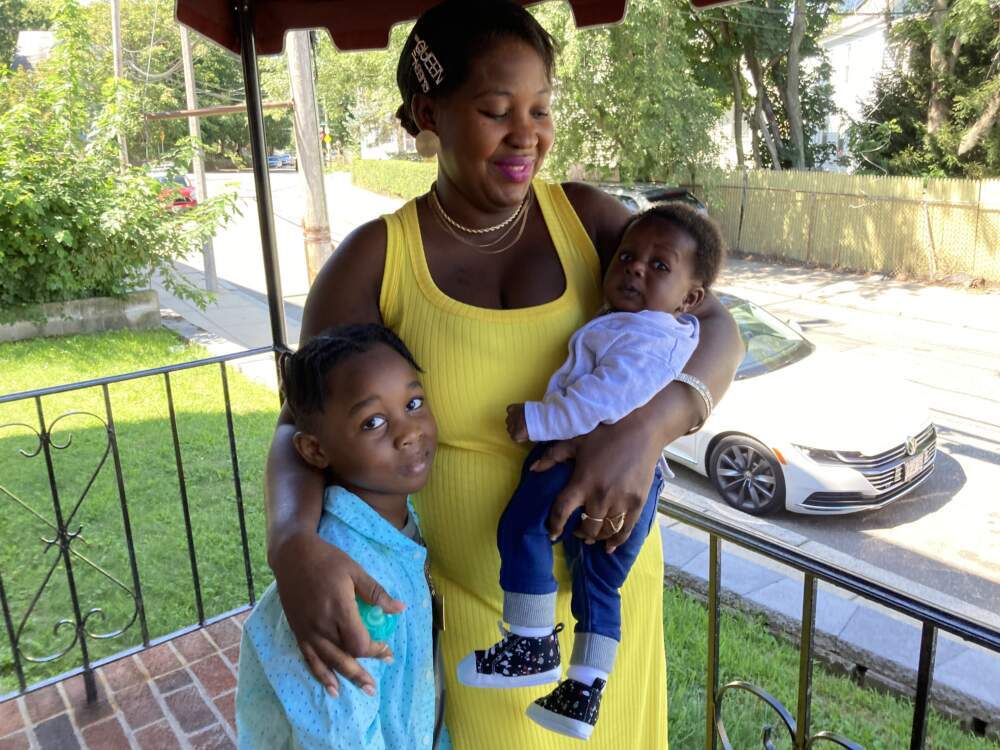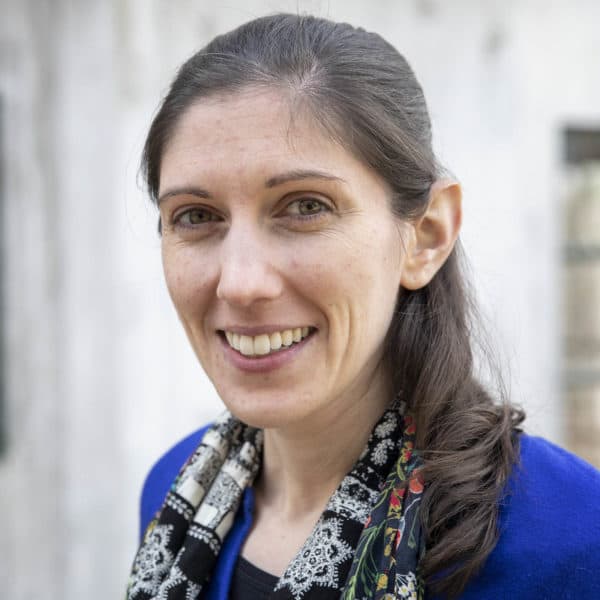Advertisement
Pregnant newcomers to Mass. can face hurdles when seeking care
When Cherlie Ocean and her 5-year-old son arrived in Massachusetts last year, they didn't know another soul. Ocean quickly learned that was a problem. She was pregnant, and her medical team told her that, according to hospital policy, her son would not be allowed to accompany her when she delivered the baby.
Most hospitals have similar policies. They stem from concerns that during childbirth or medical procedures, the parent may be unable to care for their children.
For hospitals and patients with limited resources, these policies can create a tense search for alternative child care arrangements. As a last resort, the state agency that usually deals with cases of child abuse and neglect may temporarily take custody of the child.
“It really hurt a lot,” Ocean said through a Haitian Creole interpreter, remembering the stress she felt as she tried to figure out who would care for her son. "It bothered me a lot."

Her predicament is one of several emerging issues cited by medical professionals as they grapple with an increase in immigration in Massachusetts. The hurdles for new arrivals — including food insecurity and isolation in family shelters located far from city centers — illuminate broader deficiencies in the state’s support system for recent immigrants.
The challenges can have particular consequences for people who are pregnant. According to the latest survey by the Immigrant Family Services Institute in Boston, a nonprofit that has helped more than 14,000 newly arrived Haitian immigrants in the past two years, about 30% of recently-arrived Haitian women are pregnant.
Based on intake questions, state officials estimate there are approximately 500 pregnant individuals in the family shelter system and roughly half are new arrivals.
Where should children wait?
Ocean’s uncertainty about who would care for her son is a persistent problem for patients preparing for childbirth, according to hospital staff.
“This is a very, very, very acute issue that we haven't come up with a solution for yet,” said Kettie Louis, a nurse practitioner in labor and delivery at Boston Medical Center.
Officials at Boston Medical Center did not immediately comment for this story.
The prospect of leaving a child, even temporarily, with someone unfamiliar can be difficult for any family, but especially so for parents who have journeyed long distances to get to Massachusetts, and heard about or dealt with family separation at the U.S. border. It can also be hard or even traumatizing on their children.
“You have a child in an environment where most of the time they don't speak the language, most of the time the culture is different, most of the time [they're left with] someone that does not look like them,” said Louis.
Advertisement
Her team tries to prevent situations in which the state’s Department of Children and Families takes the child. She said they warn patients early about the hospital's policy, so they can plan ahead. Louis also helps families in the state-funded shelter system seek an exception to a rule that prohibits families from watching one another's children. In some cases, this allows another family to provide child care during the delivery.
“I wish we had a better system. We've talked about this as a gap,” said Aura Obando, medical director of the family team at Boston Health Care for the Homeless Program. She noted the issue of child care can come up with any hospitalization, not just pregnancy, and it is hard for non-immigrants too, especially those with a history of DCF involvement.
“Ideally, there would be some kind of service embedded within the hospital system that would allow the children to be there,” Obando said. “But, obviously, with hospitals at capacity, that's going to be really hard to find.”
Among her patients, Obando estimated DCF gets involved when a parent is medically unable to care for a child every two or three months. A spokesperson for the state agency overseeing DCF acknowledged that the process, known as voluntary placement, happens but said it is rare.
The spokesperson said the agency has no record of any voluntary placements involving migrant families in the shelter system. However, several medical professionals and shelter operators confirmed that the issue of child care for single parents delivering babies is a recurring and challenging piece of the puzzle for newly arrived immigrants.
Ocean ultimately decided to send her son to stay with another family in the shelter system. The family had been identified by a case worker. But after a few days, they said they could no longer care for Ocean's son. Ocean’s medical team bent the rules and let her son stay in her hospital room, even though she was still recovering from a cesarean section.
“What the hospital did for me was something big, because I wanted him next to me,” Ocean said.
A healthy pregnancy
While the questions surrounding delivery had preoccupied Ocean, they weren’t her only concerns. Her pregnancy was complicated, in part because she developed high blood pressure and diabetes. Both are common in pregnancy but can be dangerous.
Before coming to Massachusetts, Ocean fled unrest in Haiti and went to live with a relative in Florida. But when the relative saw Ocean was pregnant, she kicked her out, Ocean said, leaving her with a young child and nowhere to stay.
"When I was left on the street, some people were nearby and they said, 'Why don't you come to Boston?' Ocean remembered. "They said: 'In Boston, you can go to the hospital and the hospital would be able to help you.' "
Among patients who are new immigrants, hospital staff said they see many people who have received little or no prenatal care, and certain complications have become familiar. One is a fetus that is smaller than expected for its gestational age, a condition called fetal growth restriction. It can have short-term and long-term health implications, including a variety of chronic diseases in adulthood, such as cardiovascular disease.
Another concern for some medical staff is that many new arrivals report chronic hunger, which is associated with fetal growth restriction and can have other harmful effects during pregnancy.
“One of the questions we ask is: ‘When did you last eat?’ " said Brynn Macaulay, a nurse in obstetrics, labor and delivery at Boston Medical Center. "I have heard more and more in the last few months, ‘several days ago’ as an answer, than I've ever heard anywhere that I've worked in my life.”
Most people who are new arrivals to the U.S. have access to SNAP benefits, commonly referred to as food stamps, and for those staying in the Massachusetts family shelter system, there is kitchen access or food provided for free. However, families consistently tell WBUR the food is unfamiliar, and they don’t eat it. Medical staff have noticed some children in the shelter system are losing weight.
“It's actually really common,” said Obando of Boston Health Care for the Homeless Program.
Medical teams have also noticed many families in the shelter system have limited access to outdoor space. The system expanded so rapidly over the past year, it ran out of traditional shelter units, and state officials started renting hotel rooms. Some of the hotels are near highways or other areas that are not walkable, and they often lack communal space for residents.
“Their mobility is restricted because many of them will come and say, ‘Nope, the hotel staff said we have to stay in a room. We cannot congregate downstairs. We cannot do this, we cannot do that,' ” said Louis.
She said she tries to encourage her patients not to stay in bed all day and suggests exercises they can do without leaving their rooms. According to the American College of Obstetricians and Gynecologists, exercise during pregnancy may lower the risk of gestational diabetes and preeclampsia, a serious high blood pressure condition that can be fatal if untreated.
Medical professionals point out the health of a pregnancy can have long-term implications for the parent and the child, including for brain development.
“It's heartbreaking,” said Macaulay, referencing the level of hunger she sees in her pregnant patients. "I think antithetical to a lot of different people's belief systems to see the denial of those very, very basic rights."
This article was originally published on February 15, 2024.
This segment aired on February 15, 2024.
